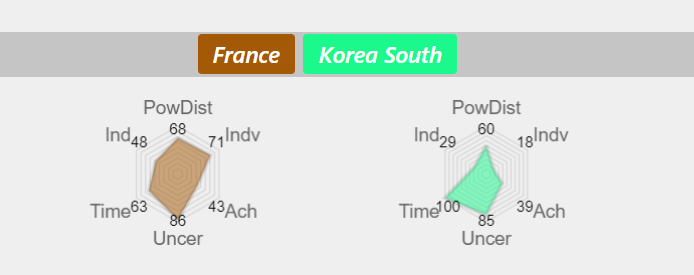Overview
A French female worker started her career with an international sports company when she was 22 years old and a trainee. After 23 years of hard work with the same company, she is now an industry director specializing in the area of gloves. From the onset of her career, she was assigned to collaborate with a South Korean team as a manager and all members of the South Korean team were men and older than her. On the first day of work while walking into the office, her subordinates murmured in a small group and gave her a peculiar and perplexed look. She was not familiar with this sort of behaviour and her initial reaction was to ask, “Is there any problem?” Everyone in the group became very quiet and one of them politely answered “Oh! Nothing, Miss!” Because she holds a higher position than the employees who were murmuring, she did not understand that there was an element of power distance that was in play. The behaviour continued to happen day after day, until she could not stand these actions anymore and organised a special meeting just to tackle this issue. When everyone on her team was in the meeting room, everyone had a straight face and looked absolutely frightened. She broke the silence by saying “I have been working with all of you for a while now and I have noticed the back talk and whispering , would anyone care explaining to me what is going on?” No one dared to speak a word and they looked into each other’s eyes with a concerned look. She then switched the tactic and said “You are all my teammates, and we work together as a team but not as enemies. Please share your opinion whenever you feel like it. If anything, I am the one who is supposed to help you, not to harm you!”. After this comment from her, an old veteran spoke up : “Then we are going to be honest with you. First of all, you are just a young woman. How can you possibly lead our team as a manager?”. She was very initially shocked but slowly realised the cultural clashes and the reason why they were all acting in a manner that she was unfamiliar with. After that, she tried to provide them with explanations and examples by putting herself in their shoes, and worked hard on getting to know every one of them, not only professionally but personally as well. Gradually, they started to accept her and invited her to join them for a laugh every now and then instead of laughing at her.
Outcome
As a young French female manager, she faced many difficulties while dealing with her South Korean team. Even though South Korea is considered a hierarchical society where people accept orders from more powerful members of the society without the need for more justification and subordinates expect to be told what to do from their manager, her team was not fond of her in the beginning but still respected her title. They would give her looks that implies that she is incapable of the position, making her feel uncomfortable as a means of non-verbal communication. Additionally, her team even verbally expressed how surprised they were by asking her “how could you possibly lead our team as a manager?!”.

Having older men in her team who have acquired this way of thinking could be related to the fact that women’s roles were limited to managing the household, children and extended family in traditional South Korean society. South Korean women have been taught the virtues of subordination and endurance as part of their moral circle from a young age to prepare for their future roles as wives and mothers. It would be prohibitive for a young South Korean women to challenge this status quo. This shows the difference in gender roles between the two cultures (French and South Korean) where it is both inhibitive and prohibitive for a woman to manage a team comprised of men in South Korea; whereas when working with her French team she did not face this situation. Aside from gender roles, power distance has a significant role when it comes to a person’s age in South Korean culture. Older people are placed on a pedestal in most Asian countries which explains the actions of the South Korean team. They did not look at her qualities, character and core values rather they judged simply because she was a young woman. In addition, they were fast with their interpretation (cultural misappropriation) without knowing enough about her French background which created cross-cultural communication obstacles which in this case was due to gender role stereotypes.
Best practice
In order to create a work environment where everybody feels seen and understood, and to avoid miscommunication, or cultural misappropriation, team members should try to postpone interpretation of another cultures social gestures until they are aware of the individual personalities and cultural references needed before placing any judgment and attaching attribution to their behaviors.
Authors
Safia Salim (LinkedIn)
Amsterdam School of International Business; Block 2, Semester 1, 2020/2021
Agassi Ngai (LinkedIn)
Amsterdam School of International Business Block 2, Semester 1, 2020/2021